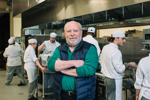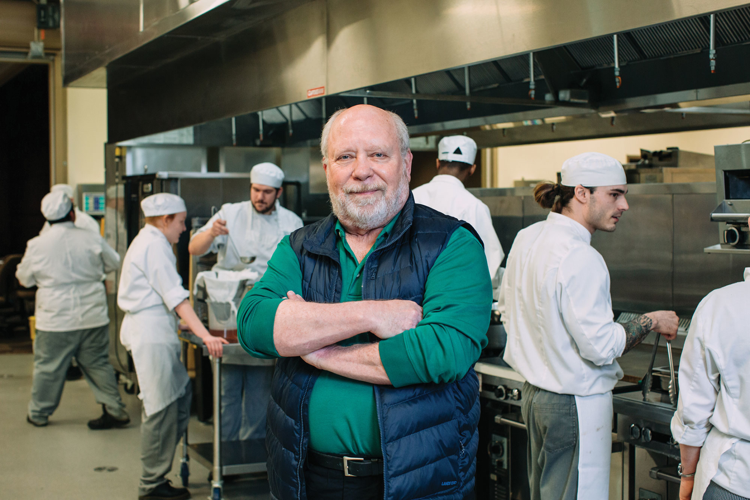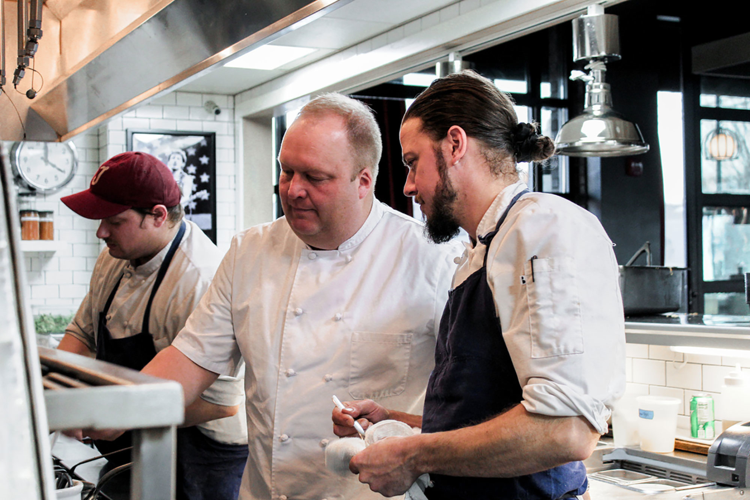
Randy Rayburn at Nashville State Community College, 2020
If you get a few Nashville chefs or restaurateurs together in a room, it won’t take long before the conversation turns to the issue of staffing shortages in the local hospitality industry. And it’s not just a Nashville problem.
“Anywhere I go for guest chef events, staffing comes up,” says Josephine chef Andy Little.
Midtown Cafe owner Randy Rayburn has been sounding the alarm for quite a while. “The status of workforce staffing for the hospitality industry has been at emergency levels for five years, and I’m not just crying wolf,” Rayburn says. “I call myself ‘The Raven’ talking about the problem: ‘It’s here! It’s here!’ There aren’t enough people.”
Kristin Beringson has run kitchens all over Nashville, and she’s currently at Ellington’s Midway Bar & Grill at the Fairlane Hotel. She sees gaps in both the numbers and talent level of available kitchen labor. “The skill set for ‘X dollars per hour’ is half of what it used to be,” says Beringson. “Cooks are getting paid $19 an hour for half the talent.”
Rayburn agrees. “The pool is so thin, that’s why the service and cooking is so bad,” he says. “I no longer have a dozen résumés to go through to pick a new employee. People are just hiring warm bodies, and we are proposing garden-hose solutions to a fire-hose problem.”
All three of these industry professionals believe that a major part of the solution to the staffing crisis lies in more and better culinary education. Each takes their own approach to training the next generation, and they agree that it will take a combination of initiatives for us to crawl out of the hole. “We created the problem — we have to solve it,” says Rayburn, a staunch believer in the concept of formalized training through culinary schools. As a matter of fact, the program at Nashville State Community College is named the Randy Rayburn School of Culinary Arts. The school offers a two-year A.A.S. degree in the culinary arts, as well as one-year certificate programs. They hope to add more specialized offerings in the future, like a six-month baking program.

Kristin Beringson
Culinary training can be expensive, but NSCC students are eligible for assistance through the Tennessee Promise grant program. This can make for an education that is considerably less expensive than those obtained at prestigious for-profit schools like the Culinary Institute of America, Johnson & Wales University, or The Art Institute of Nashville, the last of which offered kitchen training until the local campus closed in late 2018.
“I went through CIA,” says Little of the Culinary Institute of America. “I have three CIA grads working in my kitchen, and I know the sort of debt they’re carrying.” Often culinary school graduates find themselves saddled with so much debt that they don’t enter into the traditional restaurant labor pool, preferring to work in hotel kitchens or corporate hospitality, where they can just keep their heads down and earn money to pay off their loans by peeling potatoes ad finitum. “I tell people that restaurants are not a food business,” Little continues. “It’s a people business. We need to provide an appropriate work/life balance for our employees, and that includes not working 80 hours a week to pay off loans.”
The Nashville restaurant industry finds itself in a vicious cycle, in which the paucity of available labor and the high cost of living anywhere near where young cooks might want to work leads to wage inflation, which is passed on to the consumer in the form of increased dish costs. Beringson sees that as a big problem. “Guests don’t want to see wage inflation on their tab,” she says.
Little concurs. “I’d love to be able to pay my staff much better,” he says, “but it’s just not sustainable for the restaurant. Six years ago I used to be able to attract talent from New York City by telling them about the lower cost of living in Nashville. I’m not sure I can do that now.”
Little prefers to hire people earlier in their career and train them himself in his own kitchen. “When I look at a résumé, I look at where they’ve worked, not where they went to school,” he says. “Cooking is a trade, like building a chair. I’m looking for people who want to learn. One of Nashville’s competitive advantages is that most of us chefs are still cooking in our own kitchens, still teaching and learning. This generation isn’t going to learn the way I learned.”
Little employs his own version of the traditional brigade de cuisine system, in which his workers learn skills as they progress through cooking stations. “Everyone on the line learns the four most important stations: meat, fish, first hot course and garde manger,” says Little. “Everyone has to be cross-trained, because at the end of the day, people need to know that when anything needs to be done, anyone can do it. That’s why we have a hybrid brigade system, because in a traditional French kitchen, you’d never see the chef in the tall hat washing dishes.”

Andy Little
Another way Little supports his staff’s advancement is through the daily family meal, where everyone — including front-of-house workers — takes turns cooking for the entire staff. “It’s an opportunity for each one of them to show who they are as cooks,” explains Little, “because at 5 o’clock, they’re going to start cooking my food.” Little has also established a novel staff-meal program in which he asks staff members to pick a cookbook or person they are inspired by. This has evolved into Cook Your Book, where he asks employees to prepare three dishes that would be in their own book in 10 years.
Beringson also practices a different sort of culinary education — a hybrid between culinary school and practical training in her kitchen. She is a chef/mentor with the Chef Apprentice School of the Arts based out of Los Angeles. CASA’s current tuition is $13,120, which includes home study through online curriculum, a set of chef’s knives, a uniform, and access to academic and career advising, with a guarantee of job placement upon completion of the six-month certificate program. Most importantly, the program offers one-on-one training in a working kitchen, which is where Beringson comes in.
For three years, she has worked with two to four students per six-month semester and received a small stipend for her efforts. “I don’t do it for the money,” Beringson explains. “I really like it. It lets me mold little people, and I get a free intern and an extra set of hands in the kitchen.” She has also noticed that whenever she’s working from the provided syllabus to teach a new technique to a student, the rest of her kitchen staff pays attention, and are more likely to help each other learn. This is a departure from her own experience at the Art Institute.
“I love that I went to culinary school,” Beringson says. “It teaches a level of respect to the craft. The ‘Yes, Chef’ and ‘Oui, Chef’ attitude. It’s a safe bubble where you can learn a vast amount of things that make you a well-rounded cook.” Even so, she says she’s gained a new level of appreciation for the new model through CASA. “I’m seeing less of culinary school and more of the school of hard knocks, and I’ve got no problem with that. CASA is the best of both worlds, skipping that safe bubble while still providing a comfortable learning environment in a real kitchen. The students come out knowing how to work every station, and they get to see exactly what I do. You see me over there spraying dishes because the dishwasher called out? This is a real possibility for your life if you choose to go down this road. It helps them figure out really quickly if they want to be in this industry.”
Rayburn is also a believer in these sorts of apprenticeships as part of the solution to the staffing process. “We need to get them while they’re young,” he says. “We should be creating initiatives to work with the underemployed and undereducated and reach out to MNPS to involve students that are interested in hospitality as a career. The jobs are there, and more are coming! If we don’t make investments in multiple programs to add people to the pipeline, it will be really ugly for the operators.”
For his part, Chef Little remains committed to the culinary future of his adopted home. “This is a great place for people to be living, working, cooking and learning,” he says. “There’s nowhere else for me, but it’s going to take a failure somewhere in the chain for people to pay attention to it. We want to make Nashville’s restaurants better, but sometimes I wonder what Nashville’s restaurants would look like if we didn’t have to worry about if the person working the grill was going to show up tonight.”







